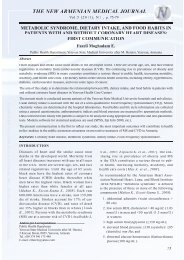Acute Leukemias - Republican Scientific Medical Library
Acute Leukemias - Republican Scientific Medical Library
Acute Leukemias - Republican Scientific Medical Library
You also want an ePaper? Increase the reach of your titles
YUMPU automatically turns print PDFs into web optimized ePapers that Google loves.
a 21.5 · CNS Prophylaxis 267<br />
IT involves the direct injection of drugs into the CSF<br />
and is an obvious way to bypass the BBB. Relatively<br />
small doses of a drug given by intrathecal injection<br />
can achieve high local concentrations, due to the small<br />
volume of CSF. Furthermore, because of intrinsically<br />
low levels of metabolizing enzymes in the CSF, agents<br />
that are subject to rapid metabolism in blood may avoid<br />
degradations in the CSF [47]. For example, one of the<br />
principal mechanisms of inactivation of cytarabine in<br />
the bloodstream is deamination catalyzed by cytidine<br />
deaminase. Cytidine deaminase is present at much lower<br />
concentration in CSF, which results in an eightfold<br />
longer half-life of the drug in CSF than in plasma. In addition,<br />
more unbound drug is available to diffuse from<br />
CSF to brain tissue because of the very low protein content<br />
in the CSF [48].<br />
IT has historically employed methotrexate single<br />
agent or methotrexate combined with cytarabine, with<br />
or without steroids. Liposomal cytarabine (DepoCyt)<br />
is a slow-release formulation of cytarabine that is manufactured<br />
by encapsulating the aqueous drug solution<br />
in spherical multivesicular particles known as Depo-<br />
Foam, which consist of 96% water and 4% biodegradable<br />
lipid. A recent trial of intrathecal DepoCyt in children<br />
with neoplastic meningitis showed that eight of the<br />
14 assessable patients demonstrated evidence of benefit<br />
manifested by prolonged disease stabilization or response<br />
[49].<br />
The importance of IT for CNS prophylaxis in adults<br />
with ALL was first established in a randomized trial<br />
comparing CNS chemo-prophylaxis with cranial irradiation<br />
with 2,400 rads plus IT methotrexate versus cranial<br />
irradiation alone [8]. Three of 28 evaluable patients<br />
(11%) receiving IT had a CNS relapse, compared with 11<br />
of 34 patients (32%) not receiving any prophylaxis.<br />
Several chemotherapy agents used systemically may<br />
have CNS activity when used at adequate doses. Systemic<br />
administration of high-dose cytarabine reaches<br />
therapeutic levels in the CSF, which is slowly degraded<br />
to ara-U due to the absence of cytidine deaminase in<br />
this compartment [45]. Thus, systemic administration<br />
of high-dose methotrexate or high-dose cytarabine<br />
can effectively eradicate CNS leukemia [50, 51], although<br />
there is patient-to-patient variability in the drug concentrations<br />
of these agents achieved in the CSF.<br />
Systemic administration of dexamethasone and<br />
prednisone have been utilized in combination with IT,<br />
and have significant antileukemic activity. Dexamethasone<br />
is five to six times more potent than prednisone<br />
[52]; in addition dexamethasone achieves higher CSF<br />
levels and has longer half-life in the CSF than prednisone<br />
[53].<br />
Although cytarabine, methotrexate, and steroids<br />
(particularly dexamethasone) are the most important<br />
systemically administered agents used for CNS prophylaxis,<br />
other agents may have some role. Etoposide administered<br />
intravenously or as low-dose orally prolonged<br />
administration achieves effective concentration in the<br />
CSF and may contribute to successful CNS prophylaxis<br />
in same pediatric regimens [54].<br />
The oral absorption of 6-mercaptopurine (6-MP) is<br />
highly variable. However, prolonged IV infusion can<br />
reach therapeutic levels in the CSF and is associated<br />
with improved antileukemic activity in vitro [55]. A recent<br />
report from Children’s Cancer Group in standardrisk<br />
ALL patients compared daily oral versus weekly intravenous<br />
6-MP. The 6-year EFS were similar in both<br />
groups. However, patients receiving IV 6-MP had unexplained<br />
shorter survival after relapse than oral 6-MP patients<br />
[56].<br />
IV administration of L-asparaginase can deplete the<br />
CSF of L-asparagine for prolonged periods of time [57,<br />
58]. Pegylated L-asparaginase has a prolonged half-life<br />
that may result in high plasma levels of asparaginase,<br />
and prolonged asparagine depletion in serum and CSF<br />
is achieved [59].<br />
Cranial irradiation has been frequently utilized in<br />
patients with high-risk CNS disease [60, 61], but CNS<br />
regimens without cranial irradiation have also achieved<br />
excellent results [62, 63]. The Pediatric Oncology Group<br />
published a clinical study where two different regimens<br />
of intrathecal and systemic chemotherapy were used for<br />
CNS prophylaxis in children with acute leukemia. The<br />
standard regimen (S) consisted on six injections of triple<br />
intrathecal chemotherapy (TIC) with methotrexate,<br />
hydrocortisone, and cytarabine administered during intensification<br />
treatment and at 8-week intervals throughout<br />
the maintenance phase for 17 additional doses. The<br />
second regimen, standard and methotrexate pulses<br />
(SAM), also specified six TIC administrations during<br />
intensification, but substituted pulses of intermediatedose<br />
parenteral methotrexate (IDM, 1 g/m 2 ) every<br />
8 weeks for the 17 maintenance TIC injections, with a<br />
low-dose IT methotrexate boost administered with the<br />
first four maintenance IDM pulses. Otherwise, systemic<br />
therapy on regimen SAM was identical to regimen S.<br />
The 5-year of an isolated CNS relapse was regimen S:<br />
good risk 2.8%, and poor risk 7.7%; for the regimen
















